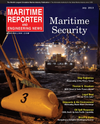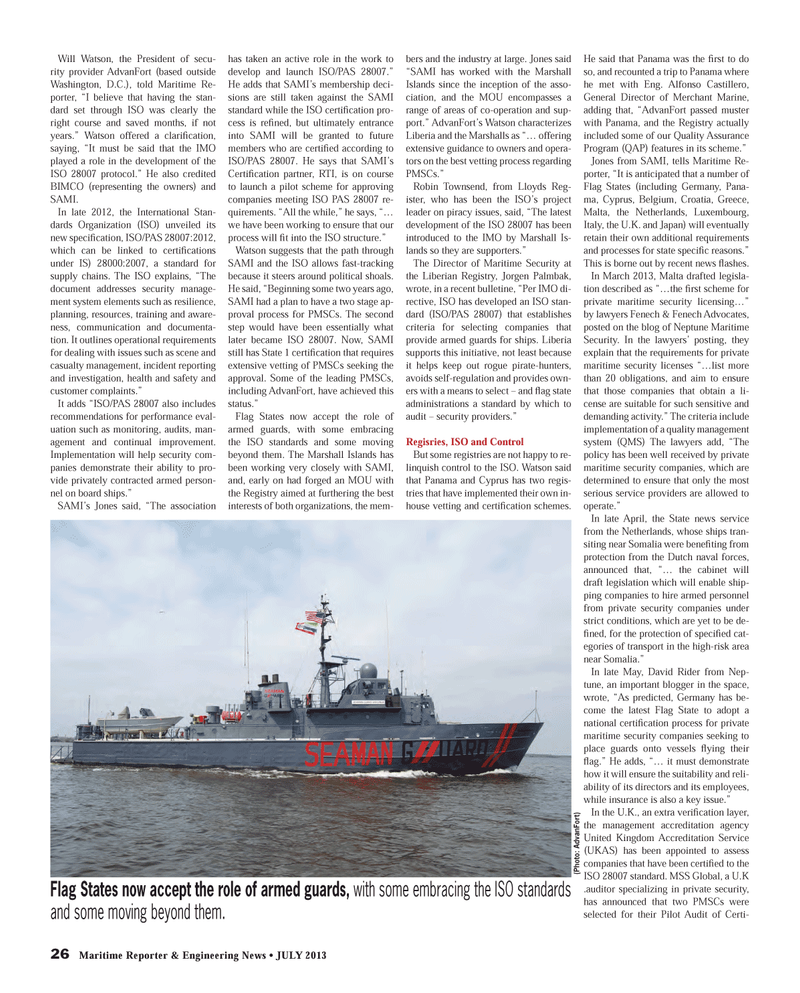
Page 26: of Maritime Reporter Magazine (July 2013)
Maritime Security Edition
Read this page in Pdf, Flash or Html5 edition of July 2013 Maritime Reporter Magazine
26 Maritime Reporter & Engineering News ? JULY 2013 Will Watson, the President of secu- rity provider AdvanFort (based outside Washington, D.C.), told Maritime Re- porter, ?I believe that having the stan- dard set through ISO was clearly the right course and saved months, if not years.? Watson offered a clari Þ cation, saying, ?It must be said that the IMO played a role in the development of the ISO 28007 protocol.? He also credited BIMCO (representing the owners) and SAMI. In late 2012, the International Stan-dards Organization (ISO) unveiled its new speciÞ cation, ISO/PAS 28007:2012, which can be linked to certiÞ cations under IS) 28000:2007, a standard for supply chains. The ISO explains, ?The document addresses security manage-ment system elements such as resilience, planning, resources, training and aware-ness, communication and documenta-tion. It outlines operational requirements for dealing with issues such as scene and casualty management, incident reporting and investigation, health and safety and customer complaints.? It adds ?ISO/PAS 28007 also includes recommendations for performance eval-uation such as monitoring, audits, man-agement and continual improvement. Implementation will help security com-panies demonstrate their ability to pro-vide privately contracted armed person-nel on board ships.? SAMI?s Jones said, ?The association has taken an active role in the work to develop and launch ISO/PAS 28007.? He adds that SAMI?s membership deci- sions are still taken against the SAMI standard while the ISO certiÞ cation pro- cess is reÞ ned, but ultimately entrance into SAMI will be granted to future members who are certiÞ ed according to ISO/PAS 28007. He says that SAMI?s CertiÞ cation partner, RTI, is on course to launch a pilot scheme for approving companies meeting ISO PAS 28007 re- quirements. ?All the while,? he says, ??we have been working to ensure that our process will Þ t into the ISO structure.? Watson suggests that the path through SAMI and the ISO allows fast-tracking because it steers around political shoals. He said, ?Beginning some two years ago, SAMI had a plan to have a two stage ap-proval process for PMSCs. The second step would have been essentially what later became ISO 28007. Now, SAMI still has State 1 certiÞ cation that requires extensive vetting of PMSCs seeking the approval. Some of the leading PMSCs, including AdvanFort, have achieved this status.?Flag States now accept the role of armed guards, with some embracing the ISO standards and some moving beyond them. The Marshall Islands has been working very closely with SAMI, and, early on had forged an MOU with the Registry aimed at furthering the best interests of both organizations, the mem- bers and the industry at large. Jones said ?SAMI has worked with the Marshall Islands since the inception of the asso-ciation, and the MOU encompasses a range of areas of co-operation and sup-port.? AdvanFort?s Watson characterizes Liberia and the Marshalls as ?? offering extensive guidance to owners and opera-tors on the best vetting process regarding PMSCs.? Robin Townsend, from Lloyds Reg- ister, who has been the ISO?s project leader on piracy issues, said, ?The latest development of the ISO 28007 has been introduced to the IMO by Marshall Is-lands so they are supporters.? The Director of Maritime Security at the Liberian Registry, Jorgen Palmbak, wrote, in a recent bulletine, ?Per IMO di-rective, ISO has developed an ISO stan-dard (ISO/PAS 28007) that establishes criteria for selecting companies that provide armed guards for ships. Liberia supports this initiative, not least because it helps keep out rogue pirate-hunters, avoids self-regulation and provides own-ers with a means to select ? and ß ag state administrations a standard by which to audit ? security providers.? Regisries, ISO and Control But some registries are not happy to re-linquish control to the ISO. Watson said that Panama and Cyprus has two regis-tries that have implemented their own in-house vetting and certiÞ cation schemes. He said that Panama was the Þ rst to do so, and recounted a trip to Panama where he met with Eng. Alfonso Castillero, General Director of Merchant Marine, adding that, ?AdvanFort passed muster with Panama, and the Registry actually included some of our Quality Assurance Program (QAP) features in its scheme.? Jones from SAMI, tells Maritime Re-porter, ?It is anticipated that a number of Flag States (including Germany, Pana- ma, Cyprus, Belgium, Croatia, Greece, Malta, the Netherlands, Luxembourg, Italy, the U.K. and Japan) will eventually retain their own additional requirements and processes for state speciÞ c reasons.? This is borne out by recent news ß ashes. In March 2013, Malta drafted legisla-tion described as ??the Þ rst scheme for private maritime security licensing?? by lawyers Fenech & Fenech Advocates, posted on the blog of Neptune Maritime Security. In the lawyers? posting, they explain that the requirements for private maritime security licenses ??list more than 20 obligations, and aim to ensure that those companies that obtain a li-cense are suitable for such sensitive and demanding activity.? The criteria include implementation of a quality management system (QMS) The lawyers add, ?The policy has been well received by private maritime security companies, which are determined to ensure that only the most serious service providers are allowed to operate.? In late April, the State news service from the Netherlands, whose ships tran-siting near Somalia were beneÞ ting from protection from the Dutch naval forces, announced that, ?? the cabinet will draft legislation which will enable ship-ping companies to hire armed personnel from private security companies under strict conditions, which are yet to be de-Þ ned, for the protection of speci Þ ed cat- egories of transport in the high-risk area near Somalia.? In late May, David Rider from Nep- tune, an important blogger in the space, wrote, ?As predicted, Germany has be-come the latest Flag State to adopt a national certiÞ cation process for private maritime security companies seeking to place guards onto vessels ß ying their ß ag.? He adds, ?? it must demonstrate how it will ensure the suitability and reli-ability of its directors and its employees, while insurance is also a key issue.? In the U.K., an extra veriÞ cation layer, the management accreditation agency United Kingdom Accreditation Service (UKAS) has been appointed to assess companies that have been certiÞ ed to the ISO 28007 standard. MSS Global, a U.K .auditor specializing in private security, has announced that two PMSCs were selected for their Pilot Audit of Certi- (Photo: AdvanFort) Flag States now accept the role of armed guards, with some embracing the ISO standards and some moving beyond them. MR #7 (26-33).indd 26MR #7 (26-33).indd 267/2/2013 2:54:03 PM7/2/2013 2:54:03 PM

 25
25

 27
27
